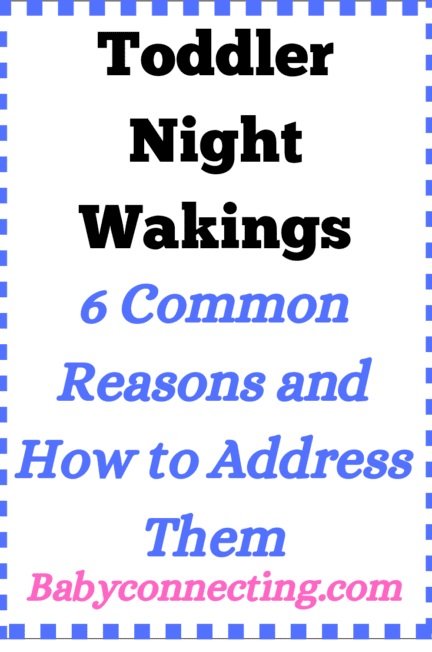“Understanding Toddler Night Wakings: 6 Common Reasons and How to Address Them”
Introduction:
Night wakings are a common occurrence in toddlers and can be a source of concern and frustration for parents. Understanding the underlying reasons behind these awakenings is crucial for providing appropriate support and promoting healthy sleep habits.
In this article, we explore six common reasons why toddlers wake up during the night, backed by research references, and offer practical strategies to address them effectively.
1. Developmental Milestones:
Toddlers undergo numerous developmental milestones, such as learning to walk, talk, and explore their surroundings independently. These milestones can lead to disruptions in sleep patterns as toddlers may be excited or anxious about mastering new skills.
Research suggests that developmental leaps are associated with increased night wakings as toddlers’ brains process new information and experiences. (Reference: Sadeh et al., 2002)
2. Separation Anxiety:
Separation anxiety is a normal part of toddlerhood and can manifest as fear or distress when separated from caregivers, particularly during bedtime. Toddlers may wake up crying or seeking reassurance from parents during the night.
Studies have shown that separation anxiety peaks between 10 to 18 months of age, coinciding with increased night waking episodes. (Reference: Mindell & Sadeh, 2001)
3. Teething Discomfort:
The teething process can cause gum soreness, pain, and discomfort, leading to disrupted sleep for toddlers. Teething typically begins around six months of age and can continue until the toddler years, with peaks of discomfort occurring during the eruption of new teeth.
Research has found a correlation between teething symptoms and night wakings in toddlers, emphasizing the importance of addressing teething-related discomfort. (Reference: Macknin et al., 2000)
4. Nightmares or Night Terrors:
Nightmares and night terrors are common occurrences in toddlers and can cause them to wake up frightened and upset during the night. Night terror usually occur during the later part of the night during REM sleep and are often related to real-life fears or experiences.
On the other hand, night terrors occur during non-REM sleep and are characterized by sudden awakenings accompanied by intense fear or agitation. Understanding the differences between nightmares and night terrors can help parents respond appropriately and provide comfort to their toddlers. (Reference: Simard et al., 2008)
5. Environmental Factors:
Environmental factors such as temperature, noise levels, and comfort can significantly impact toddler sleep quality. Toddlers may wake up if they are too hot or too cold, uncomfortable, or disturbed by external noises.
Research suggests that creating a sleep-conducive environment, including maintaining a comfortable room temperature, reducing noise levels, and ensuring a cozy sleep environment, can help minimize night wakings in toddlers. (Reference: El-Sheikh et al., 2015)
6. Sleep Associations:
Toddlers often develop sleep associations or dependencies on certain conditions or objects to fall asleep, such as being rocked to sleep, using a pacifier, or having a specific bedtime routine. When toddlers wake up during the night, they may seek these familiar conditions to help them fall back asleep.
Research indicates that promoting independent sleep skills and teaching toddlers to self-soothe can reduce night wakings and improve overall sleep quality. (Reference: Mindell et al., 2006)
Conclusion:
Understanding the common reasons behind toddler night wakings is essential for parents to provide appropriate support and interventions. Whether it’s due to developmental milestones, separation anxiety, teething discomfort, nightmares, environmental factors, or sleep associations, there are various strategies that parents can implement to address night wakings effectively.
By creating a consistent bedtime routine, promoting self-soothing skills, and addressing any underlying discomfort or fears, parents can help their toddlers enjoy restful and rejuvenating sleep. However, it’s essential to approach night wakings with patience, empathy, and flexibility, as each child’s sleep needs and experiences are unique.
With a better understanding of toddler sleep patterns and needs, parents can navigate night wakings with confidence and compassion, fostering healthy sleep habits for their little ones.



